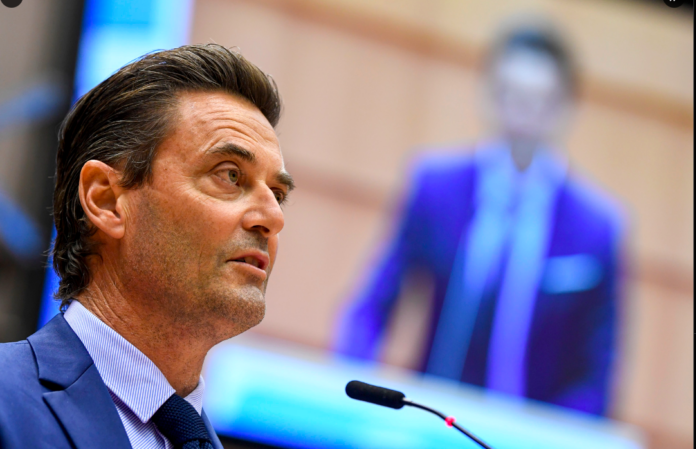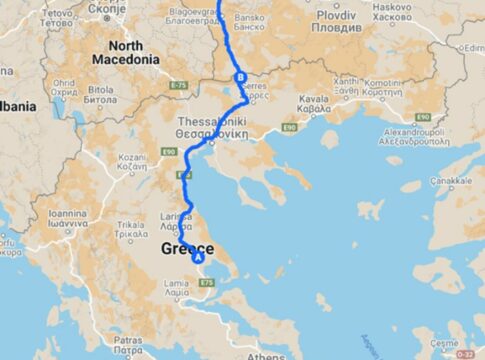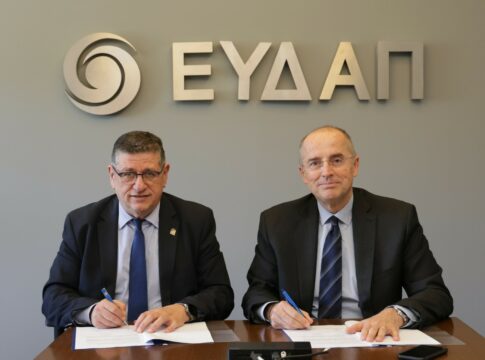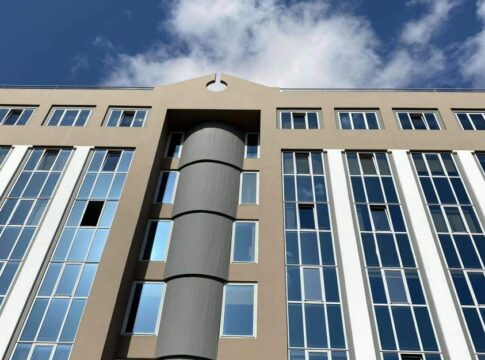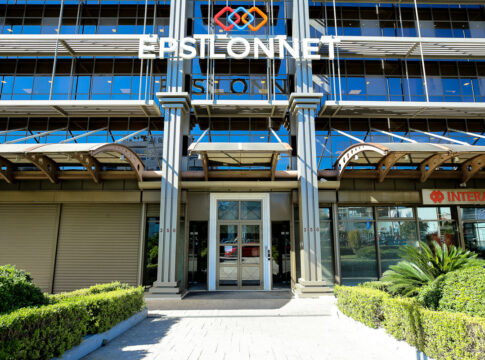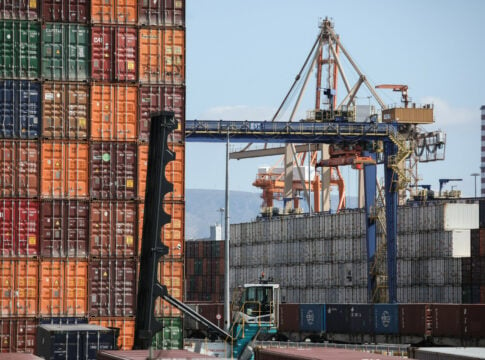By Michalis Psilos
“Europe must overcome every obstacle to growth, limiting the factors that push investments outside the European Union”, Stefano Mallia, President of the Employers’ Group at European Economic and Social Committee (EESC), since 2020.
“The real challenge is speed. We cannot afford to be derailed by petty arguments which cut our ability to move fast forward. So if there was one word to summarise all this is SPEED”, he emphasizes.
Mr Stefano Mallia has been a member of the European Economic and Social Committee since 2010 and is the President of the EESC Employers’ Group since 2020. He served in different roles at the EESC before, i.a. as Vice-President of the Employers’ Group and President of the Brexit follow-up Committee within the EESC. He has been actively involved as Rapporteur in the drawing up of a number of key Opinions on issues such as Brexit, Cohesion Policy, On-Line Gaming, the Common Strategic Framework, Immigration in the Mediterranea area.
“Our competitiveness is the prerequisite for economic success and for Europe’s future as a geopolitical actor. Companies are the engines of our society, creating employment, innovation, growth, and solutions for common challenges like the green and digital transition”, emphasizes Stefano Mallia in “N” and adds: “Europe’s leading position and its global competitiveness depend on successful and strong businesses … We need to reform the single market to make Europe a better place to invest and restart business.”
The President of European Employers in the EESC, notes with emphasis to “N”: ” I don’t have a crystal ball but I am optimist. I would not be an entrepreneur if I were not able to identify challenges and find solutions.
The interview of Stefanos Mallias in “Naftemporiki” and Michalis Psilos is as follows:
The latest Winter Economic forecast lifted the growth outlook for this year to 0,8% in the EU and the 0,9% in the euro areas are now set to narrowly avoid the technical recession that was anticipated for the turn of the year. Is that a good or bad sign for the European economy?
-It’s of course a good sign but we cannot say that we are out of the woods yet. Core inflation and high energy costs are hitting European companies harder than their American and Asian competitors.
If you add to those, incentives and subsidies, which are pushing companies to relocate and private investment to move away from Europe, the outlook is not as favourable as it seems. We should remain cautious despite confidence is improving and recent surveys suggest that economic activity is also set to avoid a contraction in the first quarter of 2023.
This is why, given the current asymmetric shock of the consequences of the war, Europe must address any hindrance to growth by reducing push factors for investments outside the EU. We, EU employers, have called for a Competitiveness Agenda, including a competitiveness check for all new proposals.
Our competitiveness is the prerequisite for economic success and for Europe’s future as a geopolitical actor. Companies are the engines of our society, creating employment, innovation, growth, and solutions for common challenges like the green and digital transition. Europe’s leadership and global competitiveness depends on successful and strong companies.
The Green Deal Industrial Plan, presented by the European Commission in February, is a first step in the right direction, however it must target not just ‘cleantech’ but all sectors, as the net-zero transformation will concern all industries.
Existing rules and red tape must also be reviewed so that jobs can be created in the European economy, fostering social and regional cohesion. The EU must simplify permit procedures and regulatory frameworks in the Single Market to create an enabling environment where relaxing EU state aid would remain temporary.
Precisely, 2023 is the 30th anniversary of the Single Market. Recently ten EU countries called for an overhaul of the EU’s Single market to make the bloc more competitive against the US and China in the clean energy sector. What’s your take on this?
-The Single Market is and remains the crown jewel of the EU. There are however a number of missing gems.
Take for example the EU services sector, which generates more than two thirds of Europe’s GDP. But also cleantech industry, such as battery production and hydrogen installation.
We need to transform the Single Market so that Europe becomes the best place to invest and do business again.
That calls for removing regulatory barriers to cross-border business operations and reducing bureaucracy, which has the potential to unleash €713 billion by the end of 2029.
The proposed actions by the Commission on 16 March fall short of addressing barriers to the internal market for services. For example, 60% of current barriers to the provision of services have been there for 20 years and now also hamper the twin transition. A thorough screening of permitting, licencing and authorisation schemes, also beyond the narrow scope of services related to clean-tech, would help move forward.
As European Employers, we are convinced that with the right political will and vision, we will succeed in truly building a competitive Europe that will drive prosperity for all.
We have to tackle ‘investment bureaucracy’
What would it take to make the EU more attractive to foreign investors?
-Of course, the availability of basic production factors – under competitive conditions –is one of the key features of a favourable business environment to attract foreign investors. This applies equally to energy, raw materials, labour, capital, and data.
The next decade will be a testing race of whether Europe will succeed creating net-zero industries, boosting technological competitiveness, and diversifying supply chains will be paramount for Europe’s continued prosperity and strategic sovereignty.
To make sure we succeed we need effective financing. We must complete the Capital Markets Union.
The financing needs are huge, and the lion’s share will need to come from private capital. The role of public investment is important but it needs to unleash private investments and attract foreign investors.
The Single Market has underpinned Europe’s prosperity for 30 years by attracting foreign investment. And the Economic and Monetary Union has been a further driver of market integration. But we have been too slow for too long on one essential building block: the Capital Markets Union.
Right now, banks provide the bulk of investment funding. Alone they cannot help the EU win the global investment race, especially in comparison with the United States. Bank loans account for 75% of corporate borrowing in the EU and bond markets for 25% – while the inverse is true in the United States.
Our start-ups and scale-ups are looking for capital. Businesses, especially SMEs, are struggling to find the patient and risk-bearing funding they need to invest in the green and digital transition. For example, the EU’s stock market capitalisation is less than half that of the United States, in percentage of GDP, and lower than that of Japan, China and the United Kingdom. Yet, Europeans save much more than Americans.
We need a Capital Markets Unition that channels Europe’s huge amount of savings into the growth engine of tomorrow.
Last but not least, we need to also tackle ‘investment bureaucracy’ which can act as a significant disincentive for FDI. This is something that SEV, which is represented in the Employers Group of the EESC, has consistently flagged.
Green Deal and strong competitiveness strategy
Mr President,is the Green deal cutting or giving wings to the EU economy?
-The European Green Deal is an important initiative to protect our planet and put Europe on a pathway to a sustainable future. We have always said that they are ready to play their part in making the Green Deal a success.
It is obvious that it can give wings but the question is how we make sure that these wings are built out of steel and not paper.
The 20 million companies we represent in Europe must be at the core of this success. Only competitive and profitable companies will bring technological solutions, sustain jobs and generate wealth.
A strong economic pillar to the Green Deal is therefore a prerequisite, and the only way to ensure that the green transition does not lead to de-industrialisation and job losses. It is therefore essential to connect the Green Deal with a strong competitiveness strategy that mobilises the hundreds of billions of euros of investments needed.
The EU’s share of global GDP has dropped from 25 percent in 1990 to 17 percent by 2020. This is disconcerting, not least as growth is necessary if we are to successfully address the great challenges of our time – geopolitical, security-related, climate-related and demographic.
Since the end of the Lisbon Agenda in 2010, economic competitiveness has fallen off the EU map. This Agenda had its flaws, but it rightly sought to make Europe “the most competitive and dynamic knowledge-economy in the world”.
With the strong economic headwinds facing Europe and the world, the EU needs to pursue structural economic reforms that raise productivity and growth and make us competitive.
A new competitiveness agenda in the EU should focus on policies at the EU level and where the EU carries legal competence. Such an agenda will reflect the Single Market Programme rather than the Lisbon Strategy, and it will aim at policies where there is a strong need for fresh initiatives that can help to make businesses, sectors and economies better equipped and motivated to compete globally
There is no environmental sustainability without innovation.
Are we making the right policies to boost innovation?
-Innovation is at the heart of productivity, growth and competitiveness. Let me say here that there is no environmental sustainability without innovation. To address climate change, Europe need as much technological progress as possible
Innovation happens by firms who develop new business models and find new ways to reach customers. But it is not a given and depends crucially on the overall business and regulatory environment: many of these factors.
First, the amount of investment in R&D and the quality of the inputs inserted in the innovation process. Knowledge is a key force behind technological change and defines the ability of an economy to absorb new technology and new ways of doing business.
Second, the regulatory frameworks for emerging innovation, including the protection of innovation through clear and well-implemented Intellectual Property Rights (IPRs), which include protection of innovation, value creation through commercialization, and new opportunities for innovation through new ways of handling IPRs. The EU needs to provide legal certainty and harmonisation of IPRs in the EU’s Single Market especially on copyright as many innovations are produced in the digital economy.
Third, the amount of innovation or output produced out of R&D investments which leads to higher levels of productivity. Low productivity firms struggle with obtaining access to knowledge and skills, data, and technologies, similar to those of high productivity firms. EU regulation, particularly in the digital economy, that includes experimentation clauses and sandboxes as well as investments in open infrastructure for testing and demonstration are two actions that the EU can take to shrink the productivity gap.
Last but not least, there is also an urgent need to attract talent and reskill, upskill workers.
The EU should work with Member States to facilitate international labour migration into the EU, make the EU an attractive destination for foreign workers with skills that are needed in the European labour market, and support and encourage human capital flows between Member States and sectors so that labour finds the place where it can be more productive.
The Commission just released the Net Zero Industry act. Is this in line with your policy ambitions?
-The ambition goes in the right direction, but the proposal is limited in scope can hamper Europe’s net-zero transformation. As said, the EU must realise that the decarbonisation of Europe is a matter of priority for the whole economy, industries and businesses, big and small.
The attempt to speed up the expansion of manufacturing projects for net-zero technologies in Europe is highly welcomed. Simpler and faster permit-granting processes are a basis to attract more investments in Europe in key technologies for a successful decarbonisation.
Europe is often too slow and too bureaucratic on all levels of planning, expanding, building and implementing industrial projects compared to our main competitors.
Missing from all this is a clear role for private finance in transitioning Europe’s industries to net zero, with mechanisms to support investors.
The ambition is right but public finance alone cannot provide the trillions needed to facilitate the transition to net zero by 2050 in line with the goals of the Paris Agreement.
Greater resilience should be built on closer cooperation with our major suppliers. Protectionist elements must be avoided. The Net-Zero Industry Act must keep markets open.
ESG is a driver for innovation
The EU’s plan to oblige companies to police their value chains for human rights and environmental standards has been met with fierce opposition from most industry sectors. How can we reconcile the ESG with competitiveness?
-Indeed, companies have to deal with the introduction of an unprecedented number of environmental, social and governance (ESG) and tax-related reporting obligations at EU level. These aim to ensure a high level of transparency, but also constitute enormous administrative burden and compliance costs for companies.
Just to deal with ESG reporting one of the big four accounting firms in the world announced the need for additional 100,000 accountants or an increase by more than a third of its headcount until 2026.
Although we know that ESG is a driver for innovation, impact and growth rather than a compliance issue, we need to make sure that ESG are taken on board by the supply chain. At present, most SMEs view ESG programmes as an unnecessary expense and don’t see the benefits. In UN Global Compact surveys, fewer than half of companies with a turnover under $25 million report on their sustainability performance. Among big groups with revenues above $1 billion, 94% do.
The Italian energy group Eni, for example, has made an open-to-all digital platform, Open-es, available so companies can learn to measure and report their sustainability data in a way that is comparable and shareable. The platform has a social network built in to help companies find new partnership opportunities along the supply chain. To date, more than 4,000 companies from 76 countries have joined, and 80% are SMEs.
Ikea is another global company that works with its suppliers to create sustainable value chains. It helps SMEs access renewable energy by negotiating bundled clean power contracts for groups of suppliers and uphold the 10 Principles of the UN Global Compact. This sets clear expectations for environmental, social, and working conditions, as well as animal welfare. The group also has a “staircase model” that helps suppliers continually improve their ESG performance.
So as you can see, three are good examples, but overall it is clear that we cannot use a one-size-fit-all approach. At the moment we need to review and limit tax-related reporting obligation, also because the overlapping in ESG reporting is considerable.
SPEED and PEACE
Mr.President, do you think we will end the decade better than we started?
-I don’t have a crystal ball but I am optimist. I would not be an entrepreneur if I were not able to identify challenges and find solutions.
I believe we know where the solutions are for the challenges we are confronted with. Little by little we are identifying the steps to implement these solutions. The real challenge is speed. We cannot afford to be derailed by petty arguments which cut our ability to move fast forward. So if there was one word to summarise all this is SPEED.
But let me end with another word. PEACE. All we have discussed cannot be possible without peace and a vibrant democracy. This is the prerequisite. The war in Ukraine is a chilling reminder that we cannot take peace for granted and CEOs in Europe and beyond should also get involved in defending democracy and the rule of law.
Mr President thank you so much for your interview to Naftemporiki.



